Ease Anxiety Before Dental Exam: Top Tips
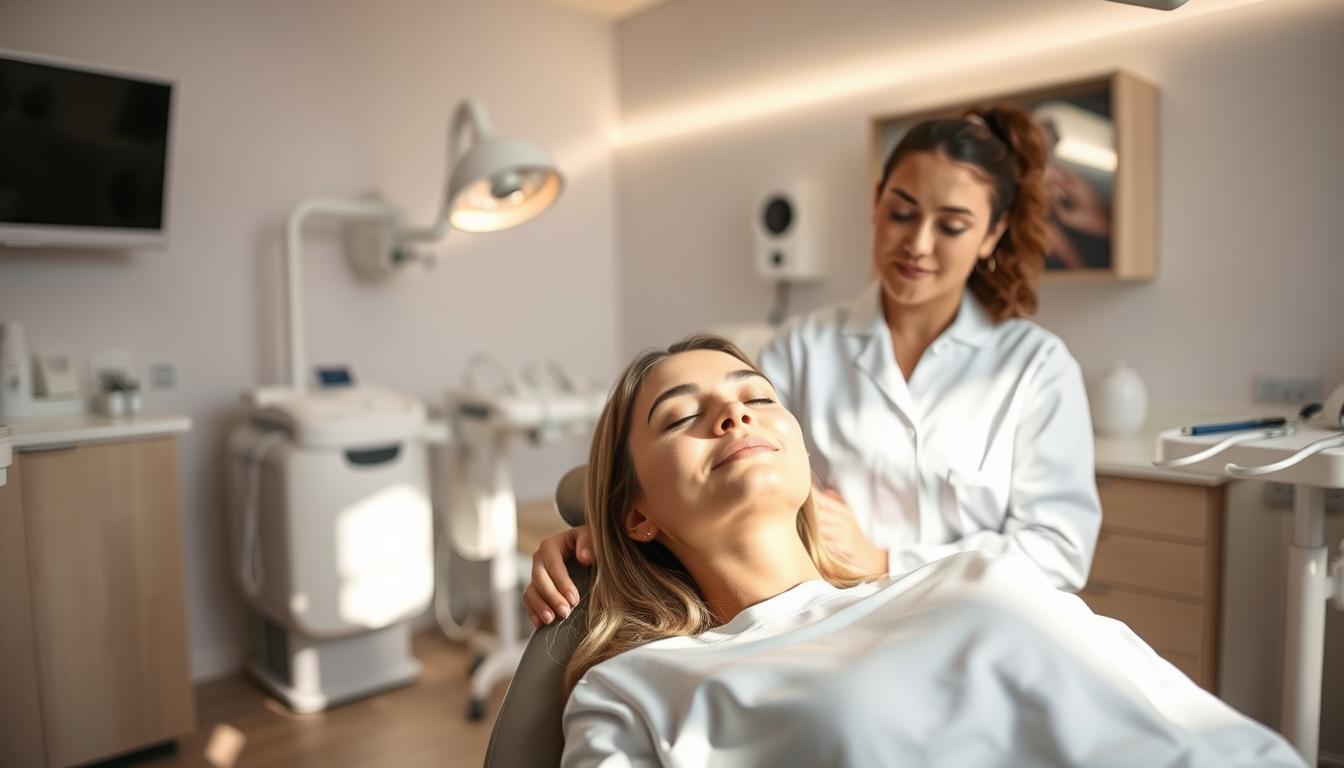
Did you know up to 20% of Americans skip the dentist because of fear? This shows a big problem for keeping mouths healthy. It’s vital to find ways to calm down before a dental visit. This helps not just with keeping teeth healthy, but also with overall health.
Starting with a stress-free dental visit means understanding why you’re scared. Then, try things like deep breathing or talking to your dentist to feel calmer. By tackling dental fears head-on, patients can look after their teeth better. This means they can make dental visits a normal part of staying healthy.
Key Takeaways
- Understanding the prevalence of dental anxiety is key to recognizing its impact on oral health.
- Proactive stress-reducing techniques can lead to more consistent and fear-free dental visits.
- Open communication with dental care providers plays a pivotal role in dental anxiety relief.
- Patients equipped with relaxation methods are better able to prioritize and maintain oral care.
- Pre-dental appointment relaxation methods contribute to overall well-being and health management.
Understanding Dental Anxiety
Exploring dental health shows us how crucial it is to understand and deal with dental anxiety. Both patients and doctors face this issue. It makes a big difference in whether people get dental care or not.
What Is Dental Anxiety?
Dental anxiety is the worry or stress someone feels about going to the dentist. It can be a little nervousness or a big fear. This fear can stop people from getting dental treatment.
Causes of Dental Anxiety
Many things can cause dental anxiety. Bad experiences before, fear of pain, and the dental office’s noises and smells play a part. These fears can make your heart beat fast and make you sweat. People need good ways to handle this fear.

Statistics on Dental Anxiety
| Statistic | Percentage |
|---|---|
| Patients reporting anxiety about dental visits | 58% |
| Patients avoiding dental care due to fear | 20% |
These numbers show how many people are really uncomfortable. This highlights the need for ways to lower stress before dentist visits. Doing this can help more people go to the dentist regularly for check-ups and treatments.
Recognizing Your Triggers
Visiting the dentist can make a lot of people feel anxious. Knowing what makes you anxious is key to handling your fears. It’s about finding out what in the dentist’s office makes you nervous. This could be the noise of the tools or worrying about pain.
Understanding your fears helps you talk better with your dentist. This can lead to a more comfortable dental visit.
Understanding your triggers is akin to mapping the terrain of your fear landscape, which is essential for navigating through it with greater confidence.
Common Triggers for Dental Anxiety can be the drill’s sound, seeing needles, or the clinic’s smell. These might bring back bad memories or fear. Knowing this is your first step towards easing your dental worry.
How to Identify Your Triggers: It might seem hard, but keeping a journal of your fears works well. Write down what happens and how you feel during dental visits. This can help show what parts of the visit scare you the most. This diary is good for thinking about your feelings and for talking with your dentist.
| Trigger | Possible Solution |
|---|---|
| Sound of dental tools | Use of noise-cancelling headphones with calming music |
| Seeing dental instruments | Pre-treatment discussion with dentist to familiarize with the tools |
| Fear of pain | Discuss pain management options including topical anesthetics |
Fear at just the thought of a dentist visit is normal. Knowing what scares you is vital to managing this fear. And it’s important for finding the best ways to relax tailored just for you.
Preparing for Your Appointment
Getting ready for a dental visit is very important. It not only helps you deal with nervousness but also makes sure you get the best care. We will look at key steps like how to schedule, picking the right dentist, and talking about your fears.
Importance of Scheduling
Choosing a relaxing time for your dental appointment can make a big difference. Pick a time when you’re usually calm, or a day when you’re not too busy. Planning like this helps handle anxiety better, making the appointment feel easier.
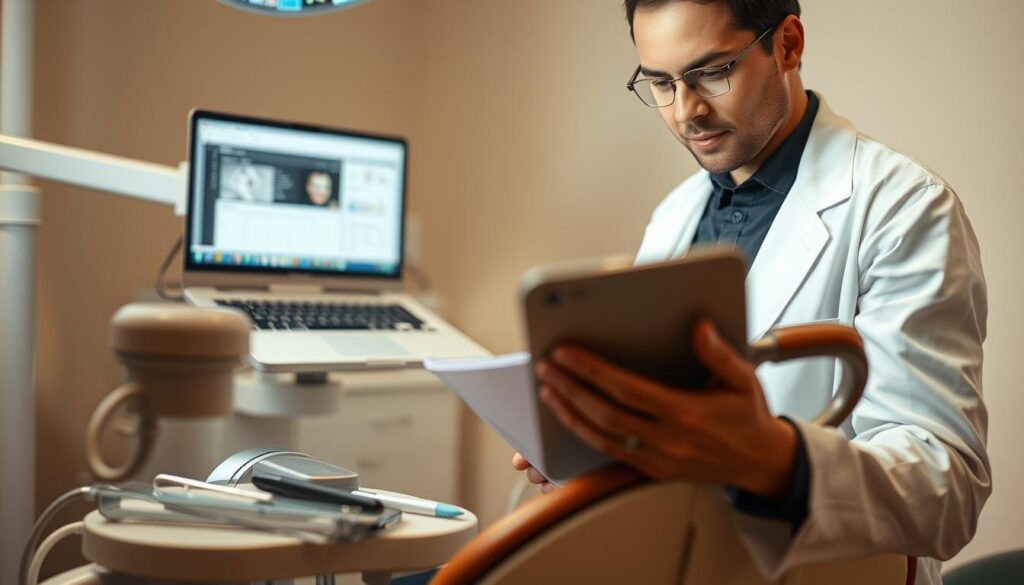
Choosing the Right Dentist
Finding a dentist who is skilled and kind makes a huge difference. Dentists at Oak Creek Dental Care know how to help people who are nervous. When looking for a dentist, think about their experience, what other patients say, and how they treat patients.
Discussing Your Anxiety with the Dentist
Being open with your dentist about your fear is crucial. Talking about your worries allows for care that meets your needs. This is vital for managing anxiety because it lets the dentist adjust their methods so you’re more comfortable.
By planning your dental visit, choosing a good dentist, and being honest about your anxieties, you can make the visit better and less stressful.
Breathing Techniques to Calm Nerves
Starting to ease dental worries can often start with learning techniques to lessen anxiety. Focused breathing methods stand out as very effective. They are easy to use and really help create a calm feeling while you’re at the dentist.
Many studies show that deep breathing is key in lessening stress during situations that might make you anxious, like dental visits.
Focusing on slow, deliberate breaths not only distracts from the procedure but also enhances overall wellbeing.
The Box breathing technique is highly praised for its clear steps, which include breathing in, holding it, and breathing out for four seconds each. This technique keeps you focused and eases the physical signs of anxiety.
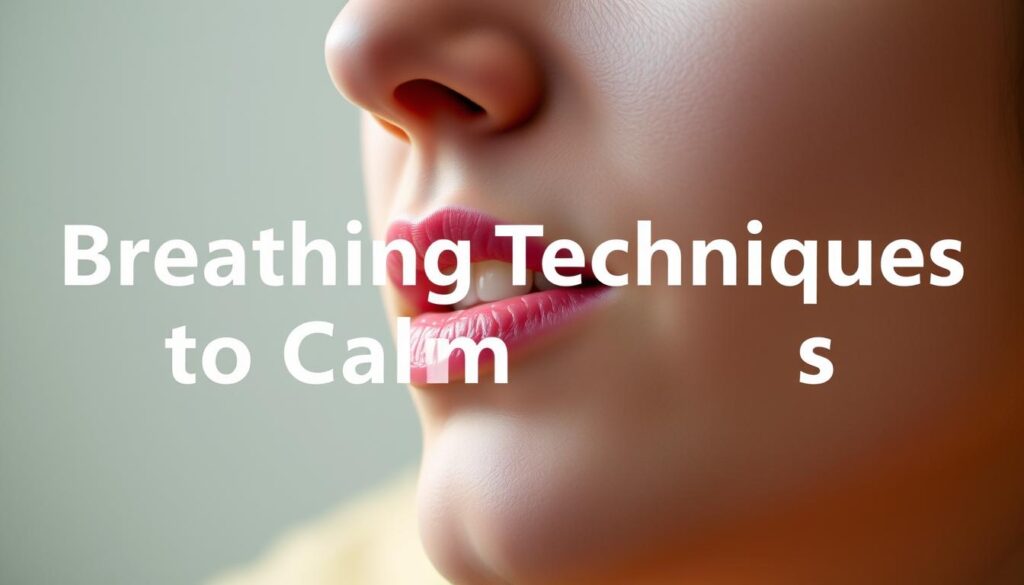
Imagining a calm place is also an effective way to use breathing exercises to strengthen the mind against stress. You can envision being on a quiet beach or in a peaceful forest as you follow your breathing pattern.
- Start with a deep inhalation for four counts.
- Hold the breath for four counts.
- Exhale slowly for four counts.
- Pause and hold again for four counts before repeating the cycle.
Using these anxiety-reducing techniques for dental procedures before your appointment can really help. It can make your dental visits much more pleasant and also improve your overall health by reducing stress.
Meditation and Mindfulness
Diving into meditation and mindfulness can help a lot. Especially for those dealing with nervousness in tense moments like dentist visits. Making these practices part of your everyday life can really strengthen your mental strength. This means you’ll feel calmer when you’re sitting in the dentist’s chair.
Benefits of Meditation
Meditation does more than just calm the spirit; it’s also great for tackling stress and making your mind clearer. It’s known for lowering blood pressure, easing anxiety, and improving how well you handle stress. This is super helpful for situations that make you nervous, such as going to the dentist.

- Mindful Breathing: Simply focus on your breath. Notice the air moving in and out of your body. You can do this anywhere, at any time.
- Observational Techniques: Use all your senses to really take in what’s around you. Notice what you see, hear, or feel. This helps you stay grounded.
- Body Scan: Tense up and then relax each part of your body one by one. This helps to ease tension and increase awareness of your body.
Apps for Guided Meditation
Today, technology makes guided meditation really accessible. There are lots of apps out there that help with finding mental peace. They offer guided meditations for all levels of experience and schedules, making it simpler to fit meditation into your day.
These meditation apps provide step-by-step guidance that helps keep your mind steady. This can be a big help before doing something that usually makes you anxious, like dental visits. The guided methods are great for beginners. They might not know how to start meditating on their own yet.
Distraction Techniques
Effective distraction strategies can really help lower anxiety at the dentist. Using engaging distractions shifts focus from dental work to nicer things. Dentists often suggest these methods to help patients feel more at ease.
Listening to Music:
- Music can be a calming escape. Soft tunes help relax the mind and calm nerves.
- Many dental places offer headphones or let you bring yours. This way, you can listen to your favorite music easily.
Watching Videos or Movies:
- Watching something is a great way to distract yourself. Many dental places have screens for movies or shows.
- This works really well with kids at the dentist. It keeps them calm and cooperative.
Engaging with a Book or Podcast:
- For those who like quiet activities, books and podcasts are perfect.
- Getting lost in a good book or podcast can make you forget you’re at the dentist.
Using these distraction methods makes dental visits less stressful and scary. By focusing on something fun and engaging, the dental experience becomes smoother and more enjoyable for patients.
Using Positive Affirmations
Positive affirmations are a strong tool. They help switch our thinking from fear to assurance in dealing with dental anxiety. This shift changes how patients feel about going to the dentist.
They are short, personal phrases that boost our fight against anxiety. By saying these phrases, we feel more in control and less stressed about dental visits.
What Are Positive Affirmations?
They’re positive sentences aimed at beating negative thoughts. They build confidence and help us handle dental visits better.
How to Create Your Own Affirmations
When making affirmations, focus on the positives of now. They should boost confidence and a sense of control. For instance, they could highlight dental health benefits and how well you handle it.
Examples of Effective Affirmations
Here are some affirmations that can change how you see dental work:
- “I am calm and relaxed. Each breath I take empowers me.”
- “I trust in the care I receive. I welcome this beneficial experience.”
- “My courage overcomes my fears. I am in control.”
Using these affirmations daily can turn dental anxiety into looking forward to good results. This change benefits our mental and physical health at the dentist.
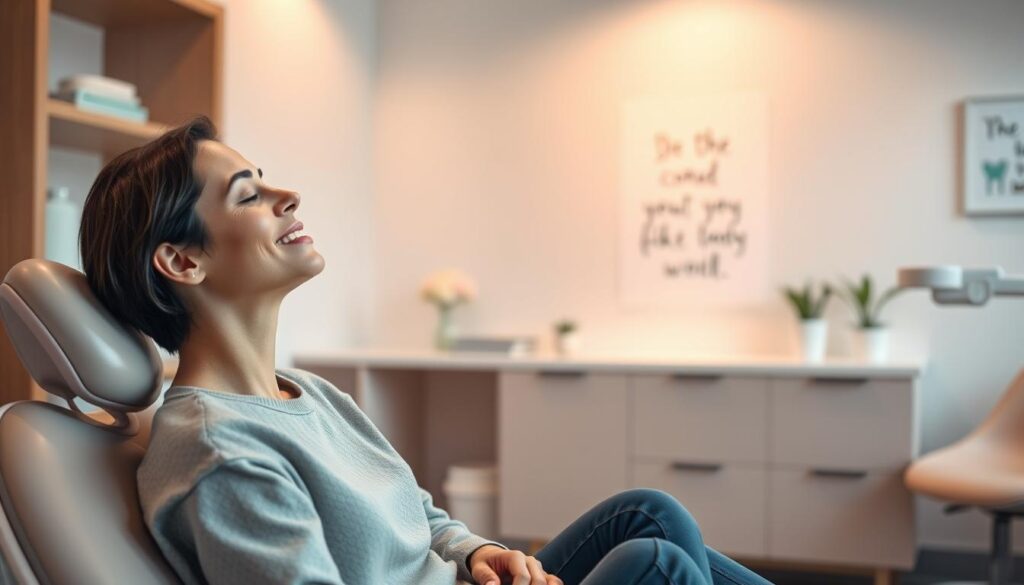
Positive affirmations aren’t just words. They’re a supportive inner voice that leads to positive thinking. They’re key in dealing with dental anxiety.
Sedation Options Available
Sedation dentistry makes dental visits easier by reducing anxiety with different methods. Patients can talk to their dentist about these options. This helps a lot, especially for those scared of dental work.
Different sedation types help with various anxiety levels and dental work. Some are mild and make you slightly sleepy. Others may make you nearly fully asleep during the procedure.
| Type of Sedation | Description | Common Use |
|---|---|---|
| Nitrous Oxide | A gas inhaled through the nose that helps patients relax almost immediately, but wears off quickly as well. | Used for shorter, less invasive procedures. |
| Oral Sedation | Medication taken orally to induce a state of drowsiness. Patients remain awake but in a relaxed state. | Ideal for patients with moderate anxiety and for procedures that require more time. |
| IV Sedation | Sedative is administered intravenously for immediate effect, allowing the dentist to continually adjust the sedation level. | Perfect for severe dental anxiety and extensive dental procedures. |
It’s important to discuss sedation with your dentist. This helps them choose the best method for you. Talking about it can also clear up worries and make you feel more comfortable.
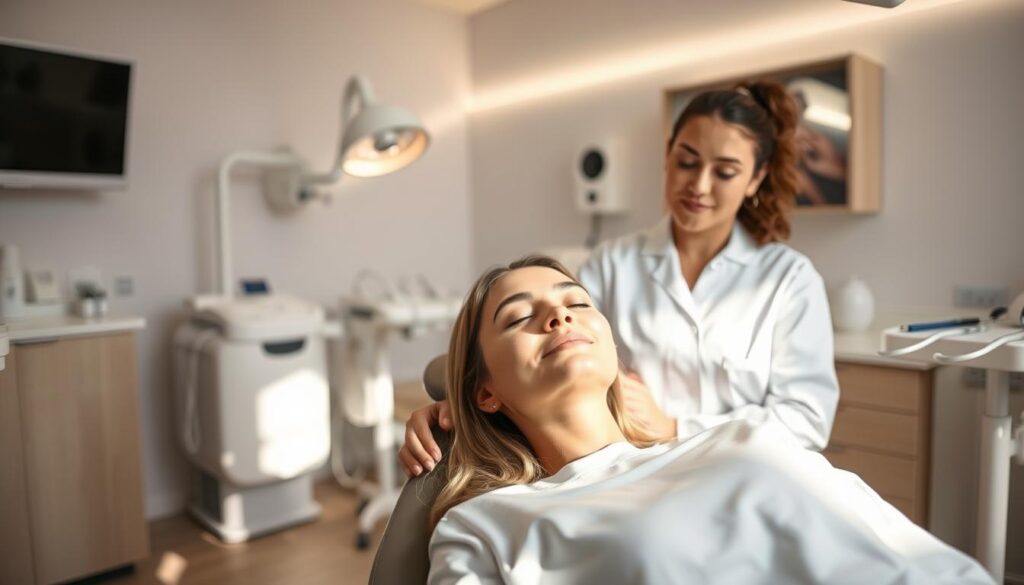
Sedation dentistry is improving all the time. It’s key to tell patients about these advances. Knowing about sedation choices helps patients feel in control. It makes going to the dentist much easier.
The Night Before Your Exam
The evening before your dental exam is very important to how you feel. To feel less anxious, it’s key to use calming techniques for the night before. Getting your space ready for relaxation and sleep is part of the process.
Preparing a Relaxing Environment
Make your bedroom a peaceful place before your dental check. You could dim the lights and play some gentle music. Having cozy bedding is also important because it helps you sleep better.

Avoiding Stimulants
Avoiding caffeine is crucial for a good night’s sleep. Stimulants disturb your sleep, making you feel more on edge. Avoid drinks like coffee and tea late in the day. Herbal teas or warm milk can help relax you because they act as natural sedatives.
Setting Up a Comforting Routine
Having a bedtime routine tells your body it’s time to rest. This could be some light stretching, reading, or taking care of your skin. Doing these things regularly helps your body relax and makes it easier to sleep.
For more information on dental visits, you might find Dental Check-ups and Cleanings interesting. Knowing what happens at the dentist can ease your worries.
In the end, these simple yet effective steps can really help you feel calmer. They prepare you for a smooth and worry-free dental appointment.
During the Dental Visit
Going to the dentist often makes people nervous. But, there are ways to make it less scary. Talking well with your dental team is very important for a better visit. Let’s look at some tips to make your dental visits easier.
Arriving Early
Getting there before your appointment can help. It lets you get used to the place. This reduces stress and gives you time to do any needed paperwork. Coming 15 to 20 minutes early really helps calm you down.
Communicating with Your Dental Team
Talking openly with your dentist and their team is key. Start by sharing any fears you have. Before they begin, talk about any worries and set up a signal to stop if you need to. This helps your dental team understand and care for you better, which makes you feel more at ease.
Taking Breaks During the Exam
If you feel uneasy during the treatment, it’s okay to ask for a break. This helps you not feel too overwhelmed. These moments are good for trying calming exercises like deep breathing.
By arriving early, talking clearly, and taking breaks, your dentist visit can be better. Using these tips can make your visit much easier to handle.
Post-Visit Self-Care
After a dental appointment, focusing on post-dental visit relaxation and rewarding self-care is key. These practices are vital for health and a positive view of dental visits.
Self-care after dental procedures is super important. It helps move from anxiety to normal life. By relaxing and rewarding themselves, patients can boost their mental health. This makes them ready for the next visit.
It’s crucial to reflect on the visit. Take time to think about how you handled anxiety and dental challenges. Reflecting helps you grow and become stronger in facing healthcare matters.
Rewarding yourself is also key. Enjoy a favorite activity or take the rest of the day off. It makes dental care a chance for joy and relaxation.
- A warm bath to lessen tension.
- A fun book or movie to shift focus.
- A walk outside to relax both mind and body.
Finding what calms and rewards you makes dental visits part of your wellness routine. By using these practices, you’ll see dental care as good for your overall health.
Lifestyle Changes to Reduce Anxiety
Making some lifestyle changes can really help our well-being and fight anxiety. Key actions include exercising, eating right, and cutting down on caffeine and alcohol. These steps don’t just ease anxiety. They also make everyday life better, helping us feel more relaxed and balanced.
Regular Exercise
Working out regularly is great for managing anxiety. Exercise releases endorphins, which are your brain’s feel-good chemicals. They act like natural painkillers and make you happy. Making exercise a habit can lessen stress, help you sleep better, and raise your self-esteem.
Healthy Eating Habits
Eating well is crucial for your mental well-being. Foods full of vitamins, minerals, and antioxidants keep your brain healthy. They also protect it against oxidative stress. This is the harm done by free radicals, which are waste products from using oxygen, damaging cells.
Caffeine and Alcohol Intake
Less caffeine and alcohol can really lower anxiety. Caffeine can make your heart beat fast and boost anxiety symptoms. Alcohol changes the serotonin levels in your brain, which affects your mood and anxiety.
By making these anxiety management lifestyle changes, people can see a big drop in their anxiety. This helps create a calm, focused mindset. It’s essential for tackling life’s hurdles, including visits for medical and dental care.
Seeking Professional Help
If you’re too scared of the dentist to lead a normal life, getting professional help for anxiety is crucial. These fears can be deep-rooted, making it tough to get the dental care you need. Therapy offers a way to handle these fears head-on.
Choosing the right therapy for dental fears is key. Cognitive Behavioral Therapy (CBT) is often the best choice. It changes how you think and feel about going to the dentist. Other methods, like slowly getting used to dental settings, can help too.
Finding a therapist who knows how to deal with anxiety might seem hard. Look for one experienced in treating fears. Getting suggestions from your regular doctor or online can help make finding someone a bit easier.
| Criteria | Description | Importance |
|---|---|---|
| Specialization | Therapist’s experience with phobias and anxiety disorders. | High |
| Methods | Type of therapy offered (e.g., CBT, exposure therapy). | High |
| Accessibility | Location and availability of the therapist. | Medium |
| Insurance | Acceptance of insurance which can affect cost and access. | Medium |
Community Support and Resources
Finding strong community support and detailed dental anxiety resources can make dental visits less stressful. These resources offer useful tips and create a supportive space. They help people manage and get past their anxiety.
Joining support groups is a helpful step. In these groups, members share their experiences and coping methods. They’re led by facilitators. This sharing can be very comforting. It helps people see they’re not fighting this alone.
The internet is full of online resources for dental anxiety. There are sites and forums with articles, professional contacts, and success stories. People can find help and support without leaving home. For example, tips on regular dental care educate patients on dental visits.
Local workshops and seminars are also great. Run by healthcare experts, they teach how to handle dental procedures. These events offer practical tips for reducing anxiety. They also give hands-on advice for immediate use.
Together, these community support options and dental anxiety resources offer various ways for individuals to get help. They can find what suits their needs best.
Continuing Education About Dental Health
Education helps people handle dental anxiety better. Knowing more about understanding of dental procedures reduces fear. When we learn what happens during dental treatments, we understand our care better. This makes dental visits less scary and shows why they’re important.
Understanding Procedures
Learning about dental health education helps lessen worries. When you know what happens during cleanings, fillings, or crowns, it’s less intimidating. For instance, modern dental tech is less scary. You can start learning by reading online about dental check-ups at trusted dental websites.
How Knowledge Reduces Fear
Not knowing can make us scared. But our goal is to make things clear. Studies show that knowing about dental treatments makes patients less anxious. Learning about procedures helps patients feel in control and less worried.
Resources for Learning About Dental Care
Many resources are available to learn about dental health. Dental associations, blogs, and videos offer a lot of information. These resources are for everyone, not just doctors. Using them makes dental visits less stressful, helping our goal to empower patients.


